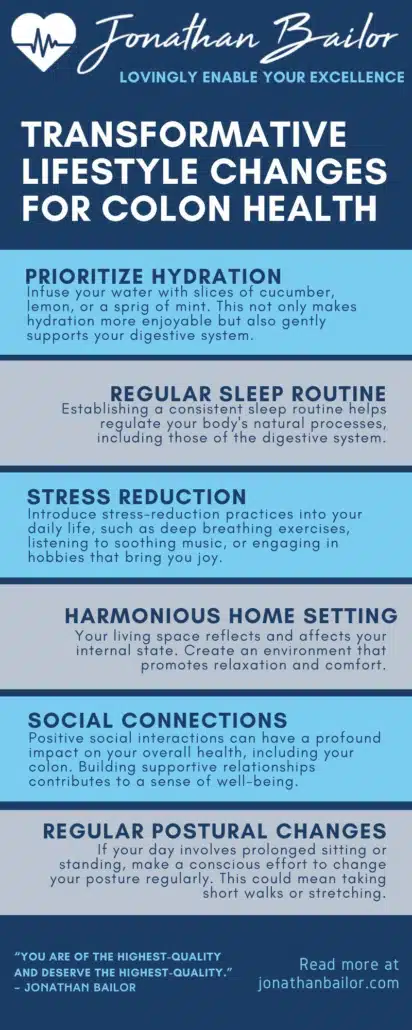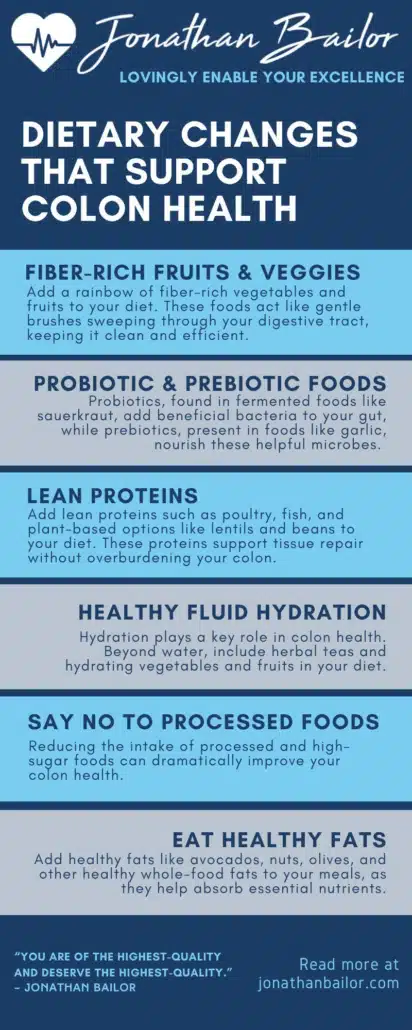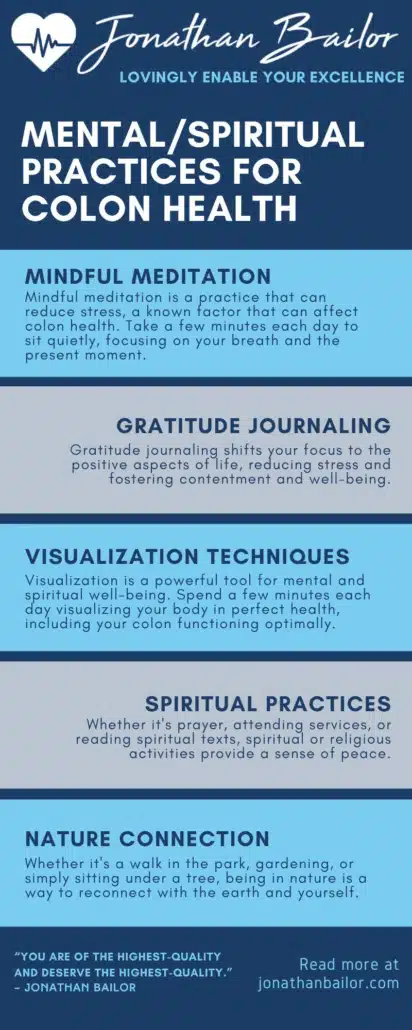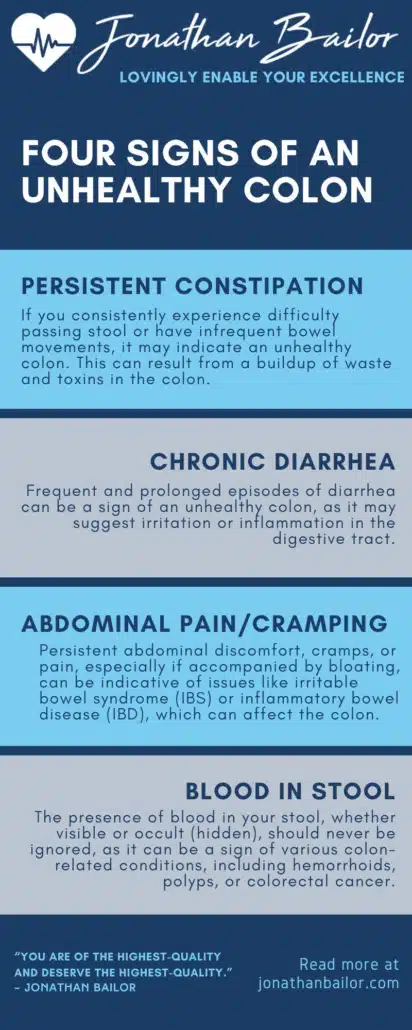21 Tips to Improve Colon Health and Reduce the Risk of Colon Issues
Are you ready to take positive steps to reduce the risk of colon issues? Here are expert techniques to do just that in this colon health guide with Jonathan Bailor.
As we journey through life, prioritizing our health becomes more than just a goal—it’s a necessity. Among the various health concerns, colon health is pivotal, especially as we embrace the wisdom of our years. Why? Because a healthy colon is not just about preventing discomfort; it’s about nurturing an environment where our entire body can thrive.
By the way, if you love content about the health of your colon then check out our Colon Health: 24 Tips to Reduce the Risk of Colon Issues and Your Guide to 28 Evidence-Based Treatments to Enhance Lower Colon Health guides next!
Now, you might think, “Colon health? That sounds complicated.” But here’s some good news: it doesn’t have to be. Maintaining a healthy colon can be simpler and more enjoyable than you ever imagined. Imagine a path paved with wholesome habits, where each step not only brings you closer to optimal colon health but also adds a sprinkle of joy and vitality to your everyday life.
We’re about to explore a series of practical, easy-to-implement tips that can significantly reduce the risk of colon issues. These tips aren’t just random suggestions; they’re pearls of wisdom, finely tuned to work harmoniously with your body’s natural rhythms. Think of them as your personal toolkit for a healthy colon—a collection of strategies that are as effective as they are empowering.
Why should this matter to you? Because taking care of your colon is like nurturing the roots of a tree. When the roots are strong, the tree flourishes, and so will you, with abundant energy, a vibrant spirit, and a sense of well-being that radiates from within.
This guide is crafted with care and understanding, knowing that each of you brings your unique story and lifestyle to the table. Whether you’re someone who enjoys the simple pleasures of life, a busy professional balancing a hectic schedule, or someone who loves spending time with family and friends, these tips are designed to seamlessly blend into your life, enhancing your health without disrupting your routine.
And here’s the part where it gets even better: as you read through these tips, you’ll find yourself nodding along, recognizing the ease with which you can integrate them into your daily life. You’ll feel inspired to share these nuggets of wisdom with your loved ones, sparking conversations about health that are both meaningful and uplifting. Imagine the joy of knowing that by sharing this knowledge, you’re contributing to the well-being of those you care about.
So, let’s embark on this journey together—a journey towards a healthier, happier you. It’s a path filled with discovery, care, and a deep understanding of your body’s needs. Welcome to your guide to colon health—a journey of wellness, joy, and shared wisdom.
Transformative Lifestyle Changes for a Healthy Colon
Embarking on a journey to keeping your colon healthy can be a serene and enlightening experience. It’s about more than just what you eat or how much you move; it’s about the small yet impactful lifestyle choices that create a harmonious environment for your body. These changes are crucial, especially considering how the risk of colon cancer increases with certain lifestyle factors.
These lifestyle changes are like gentle whispers of care to your system, each contributing to a healthier, more vibrant you. They may help reduce the risk of inflammatory bowel disease, prevent colon cancer, and limit other colon issues. Let’s explore these transformative steps that can be easily woven into the tapestry of your daily life, creating a beautiful balance that supports your colon health.
1. Prioritize Hydration with an Infusion Twist
Water is the essence of life, and staying well-hydrated is key to keeping your colon healthy. But let’s add a twist to this: infuse your water with slices of cucumber, lemon, or a sprig of mint. This not only makes hydration more enjoyable but also gently supports your digestive system. Imagine your body as a serene river, with water as the current that keeps everything flowing smoothly, cleansing and refreshing every part of you.
2. Embrace a Regular Sleep Routine
Sleep is the unsung hero of colon health. Establishing a consistent sleep routine helps regulate your body’s natural processes, including those of the digestive system. Think of sleep as a restorative nighttime ritual when your body heals and rejuvenates. Picture yourself waking up refreshed each morning, with your body thanking you for the restful night.
3. Cultivate Stress-Reduction Practices
Stress can be a silent disruptor of a healthy colon. Introduce stress-reduction practices into your daily life, such as deep breathing exercises, listening to soothing music, or engaging in hobbies that bring you joy. These practices are like a soft melody, harmonizing your body’s rhythms and creating a peaceful internal environment conducive to health.
4. Create a Balanced Home Environment
Your living space reflects and affects your internal state. Create an environment that promotes relaxation and comfort. This could mean decluttering your space, introducing plants for a touch of nature, or setting up a special nook for relaxation. A harmonious home environment acts as a sanctuary, supporting your overall well-being and, in turn, your colon health.
5. Foster Positive Social Connections
Positive social interactions can profoundly impact your overall health, including your colon. Engaging in meaningful conversations, sharing laughter, and building supportive relationships contribute to a sense of well-being. These connections act like a balm, soothing your mind and, indirectly, supporting the health of your digestive system.
6. Regularly Change Postures During the Day
If your day involves prolonged sitting or standing, make a conscious effort to change your posture regularly. This could mean taking short walks, stretching, or simply altering your sitting position. These subtle movements encourage healthy blood flow, gently massaging your internal organs, including the colon, and promoting their optimal function.
Each of these lifestyle changes is a step towards nurturing your colon’s health. They intertwine with your daily life, creating a symphony of habits that are as beneficial as they are enjoyable. By embracing these practices, you’re not just taking care of your colon; you’re nurturing your entire being, paving the way for a life filled with health and happiness.

Feeling Better Is Priceless, That's Why We Don't Put A Price On It!
“It’s Like A Free and Medically Valid Version of Noom and Weight Watchers Online”
~ Dr. Doctor Matthew Oleshiak, MD
Click the 'LEARN MORE' button below for free lifetime access to the fast fix program developed by Jonathan and top Ivy League Medical Doctors
LEARN MOREP.S. It's not a free trial. It's not part of the program for free. The entire program is free, forever, for real! No credit card needed.
Nourishing Your Colon: Dietary Changes to Keep Your Colon Healthy
When it comes to nurturing colon health, the role of a healthy diet is undeniably significant. Each morsel of food you consume can be a powerful force, working quietly yet effectively to support your digestive system. Think of your diet as a garden, where everything you plant contributes to the flourishing of your health.
The following dietary changes are akin to planting the most beneficial seeds in this garden, ensuring that each meal brings you closer to a healthier colon. These are simple yet profound changes that weave effortlessly into your daily eating habits, bringing about a positive transformation in your overall health.
1. Embrace Fiber-Rich Vegetables and Fruits
Incorporate a rainbow of fiber-rich vegetables and fruits into your diet. These natural wonders are the cornerstones of a healthy colon, acting like gentle brushes sweeping through your digestive tract, keeping it clean and efficient. Picture vibrant salads, steamed greens, and colorful fruit bowls; each bite tantalizes your taste buds and provides the fiber needed for a healthy colon. Studies show that a lack of fiber increases your colorectal cancer risk.
2. Include Probiotic and Prebiotic Foods
Probiotics, found in fermented foods like yogurt and sauerkraut, introduce beneficial bacteria to your gut, while prebiotics, present in foods like garlic and bananas, nourish these helpful microbes. Imagine these foods as nurturing friends to your gut flora, creating a balanced and healthy ecosystem within your digestive system.
3. Opt for Lean Proteins
Incorporate lean proteins such as poultry, fish and plant-based options like lentils and beans. These proteins are like building blocks for your body, supporting tissue repair without overburdening your colon. They provide the necessary nutrients while ensuring your digestive system runs smoothly.
4. Stay Hydrated with Healthy Fluids
Hydration plays a key role in colon health. Beyond water, include herbal teas and hydrating vegetables and fruits in your diet. These fluids act like gentle streams, maintaining flow and balance in your digestive tract and aiding in the absorption of nutrients and the elimination of waste.
5. Limit Processed and High-Sugar Foods
Reducing the intake of processed and high-sugar foods can dramatically improve your colon health and decrease your risk of colon cancer. These foods can disrupt the delicate balance of your digestive system. By contrast, whole, unprocessed foods promote good colon health. So, choosing these unprocessed foods gives your colon the chance to thrive in a less inflammatory environment.
6. Choose Healthy Fats Wisely
Incorporate healthy fats like avocados, nuts, olives, and other healthy whole-food fats into your meals. These fats are like lubricants for your digestive system, aiding in absorbing essential nutrients while ensuring everything moves through your colon seamlessly.
By integrating these dietary changes into your life, you’re not only fostering a healthier colon but also enriching your overall well-being. Each food choice becomes an opportunity to nourish and cherish your body, enhancing your health with every bite. This journey of dietary transformation is one of self-care and respect for the incredible workings of your own body.

Energizing Movement: Physical Activities for a Healthy Colon
The symphony of a healthy colon is incomplete without the gentle rhythm of physical activity. Think of exercise as a melody that flows through your body, tuning each organ, including your colon, to its optimal frequency. The right kind of physical activity can be a source of rejuvenation, acting as a catalyst for maintaining a healthy colon. They don’t have to be strenuous or time-consuming; even simple, joyful movements can create significant positive changes.
Let’s explore some physical activities specifically beneficial for your colon, each designed to integrate seamlessly into your daily routine, creating a harmony of health and vitality.
1. Gentle Walking: The Joyful Step Forward
Walking is a wonderfully effective activity for colon health. A brisk daily walk can stimulate your digestive system, promoting regular bowel movements. Picture yourself taking a serene walk in a park or around your neighborhood; this isn’t just a physical activity; it’s a moment of connection with your surroundings, a time to breathe in the world’s beauty while giving your colon the care it needs.
2. Yoga: The Art of Stretching and Soothing
Yoga, with its emphasis on stretching and relaxation, can be particularly beneficial for your digestive system. The gentle twists and bends in yoga are like a soft massage for your internal organs, including your colon, enhancing blood flow and digestion. Envision yourself flowing through these postures, each movement bringing you closer to balance and health.
3. Swimming: The Refreshing Embrace
Swimming is an excellent cardiovascular exercise and a gentle way to engage your abdominal muscles, which can aid digestion and colon function. Imagine the soothing sensation of water as you glide through it. This activity is as calming to your mind as it benefits your colon.
4. Cycling: The Journey of Smooth Rotation
Cycling outdoors or on a stationary bike is another fantastic way to support colon health. The cycling motion can help increase abdominal muscle activity and aid in the efficient movement of waste through your colon. Picture yourself pedaling through scenic routes or engaging in a joyful cycling session at home; each rotation is a step towards a healthier you.
These activities are more than just exercises; they’re an expression of care for your body. Integrating them into your daily life can profoundly change your colon health and overall well-being. So, embrace these movements with joy and let them lead you on a journey towards a harmonious, healthy life.

Harmonizing Mind and Spirit: Mental and Spiritual Practices for Colon Health
In the grand orchestra of our health, our mental and spiritual well-being play a vital, yet often understated, role. Just as our physical actions can impact our colon health, so too can the state of our mind and spirit. These aspects of our being are like gentle undercurrents, silently shaping the health of our entire body, including our digestive system. Embracing mental and spiritual practices can create a serene internal environment, fostering a healthier colon and a more fulfilled and balanced life.
Let’s explore some mental and spiritual changes that can be beautifully integrated into your daily routine, each a stepping stone to tranquility and well-being.
1. Mindful Meditation: The Quiet Reflection
Mindful meditation is a practice that can significantly reduce stress, a known factor that can affect colon health. Dedicate a few minutes each day to sit quietly, focusing on your breath and the present moment. Imagine this practice as a peaceful journey inward, a time to disconnect from the chaos of the outside world and connect with your inner self, creating a calmness that benefits your whole body.
2. Gratitude Journaling: The Power of Positivity
Keeping a gratitude journal can be a transformative mental practice. Each day, take a moment to write down the things you are grateful for. This habit shifts your focus to the positive aspects of life, reducing stress and fostering a sense of contentment and well-being. Picture each entry as a seed of positivity, growing into a beautiful garden of mental peace that supports your colon health.
3. Visualization Techniques: The Vision of Health
Visualization is a powerful tool for mental and spiritual well-being. Spend a few minutes each day visualizing your body in perfect health, including your colon functioning optimally. This practice is like painting a masterpiece in your mind, where every stroke adds to a picture of health and vitality, reinforcing the body’s ability to heal and maintain wellness.
4. Engage in Regular Spiritual or Religious Practices
Regular engagement in these practices can be deeply beneficial if you adhere to spiritual or religious beliefs. Whether it’s prayer, attending services, or reading spiritual texts, these activities provide a sense of peace and purpose. They are like anchors, grounding you in tranquility and aligning your mental and spiritual health with your physical well-being.
5. Connect with Nature: The Soul’s Respite
Spending time in nature can profoundly impact your mental and spiritual health. Whether it’s a walk in the park, gardening, or simply sitting under a tree, being in nature is a way to reconnect with the earth and yourself. It’s like a symphony of peace, where every natural sound and sight plays a note that soothes the soul and, in turn, nurtures your colon health.
These mental and spiritual practices are like calm whispers to your body, gently aligning your internal systems toward health and harmony. Incorporating them into your life can open doors to a healthier colon and a more peaceful and joyful existence.

FAQs: Understanding Colon Health
Navigating the intricacies of keeping your colon healthy can sometimes feel like exploring uncharted territory. With a myriad of questions and curiosities, it’s essential to seek clarity and understanding. Here, we address some frequently asked questions about colon health, offering insights that are both informative and easy to comprehend. Each answer is crafted to enhance your knowledge, helping you make informed decisions about your well-being.
1. What are common signs of an unhealthy colon?
Common signs of an unhealthy colon can include irregular bowel movements, such as constipation or diarrhea, abdominal pain, bloating, and excessive gas. It’s important to listen to these signals from your body, as they can be indicators that your colon might be struggling. Persistent changes in bowel habits or discomfort should always be discussed with a healthcare professional, as they can sometimes be signs of more serious conditions, such as colon cancer, colorectal cancer, irritable bowel syndrome, or inflammatory bowel diseases.
2. How often should bowel movements occur for good colon health?
Healthy bowel movement frequency can vary from person to person. Typically, a range of three times a day to three times a week is considered normal. Consistency and ease of passage are also important factors. Regular, smooth bowel movements suggest that your colon is functioning well. However, any significant changes in bowel habits, frequency, or consistency should be discussed with a healthcare professional.
3. Can stress affect colon health?
Yes, stress can significantly impact colon health. Stress can disrupt the natural balance of your digestive system, leading to symptoms like constipation, diarrhea, or abdominal discomfort. The gut-brain connection is crucial here, as stress can affect gut motility and sensitivity. Managing stress through mindfulness, relaxation techniques, or professional support can positively influence colon health.
4. Are there any specific foods that are particularly good for colon health?
Foods high in dietary fiber, such as fruits, vegetables, and legumes, are particularly beneficial for keeping your colon healthy. They aid in digestion, help prevent constipation, and maintain a healthy gut environment. Probiotic-rich foods, like yogurt and fermented foods, can also support a healthy biome. It’s important to maintain a balanced diet, as a variety of nutrients contribute to overall colon health.
5. How important is hydration for colon health?
Hydration is crucial for colon health. Water helps to soften stool, making it easier to pass and reducing the risk of constipation. Adequate fluid intake supports the body’s natural detoxification processes and aids in digestion. It’s recommended to drink sufficient water throughout the day, and possibly more if you’re consuming a high-fiber diet, to ensure that your digestive system functions smoothly.
Understanding your colon health is a key component of your overall well-being. By addressing these common questions, we hope to shed light on the important aspects of maintaining a healthy colon, empowering you with the knowledge to take proactive steps toward a healthier life.

Sharing the Gift of Colon Health: A Closing Note
As we conclude this enlightening journey through the realms of colon health, it’s clear that each small step we take is a leap toward a healthier, more vibrant life. These insights, from nurturing dietary habits to embracing gentle physical activities and fostering mental and spiritual balance, are more than just personal tools; they’re gifts of wellness to be shared. I encourage you to spread this wealth of knowledge with your friends and family through social media and email. Let’s create a ripple of health and awareness, transforming not just our lives but those of our loved ones, too.
Feeling Better Is Priceless, That's Why We Don't Put A Price On It!
“It’s Like A Free and Medically Valid Version of Noom and Weight Watchers Online”
~ Dr. Doctor Matthew Oleshiak, MD
Click the 'LEARN MORE' button below for free lifetime access to the fast fix program developed by Jonathan and top Ivy League Medical Doctors
LEARN MOREP.S. It's not a free trial. It's not part of the program for free. The entire program is free, forever, for real! No credit card needed.




